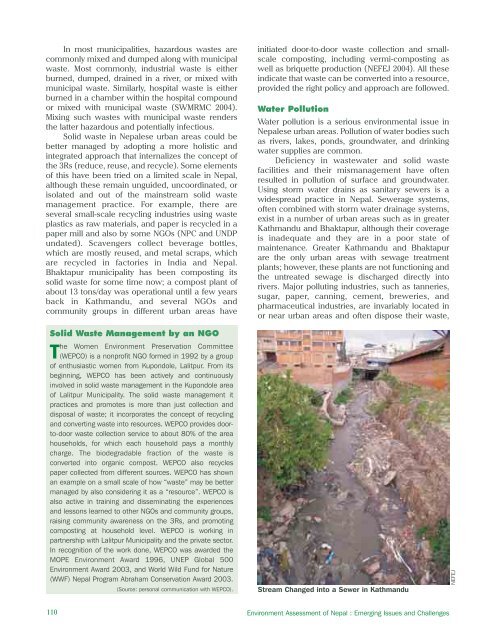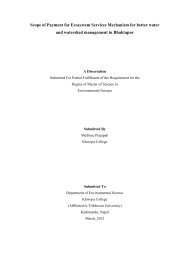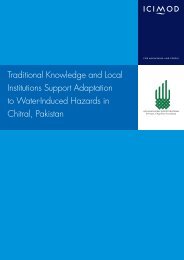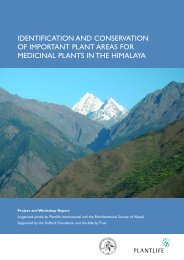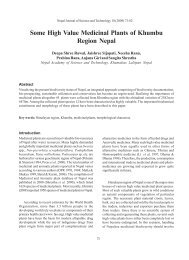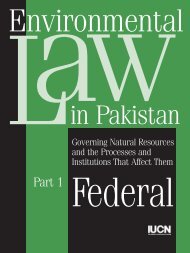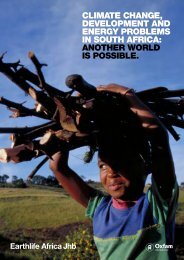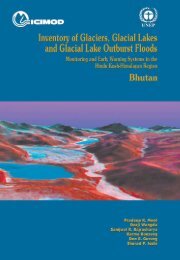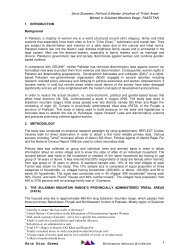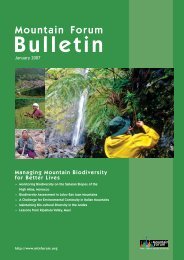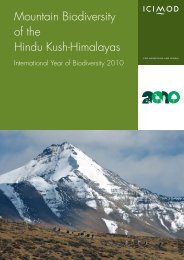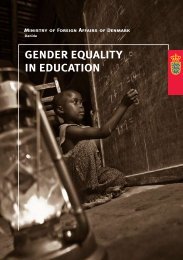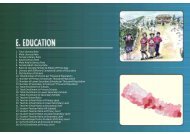In most municipalities, hazardous wastes arecommonly mixed and dumped along with municipalwaste. Most commonly, industrial waste is eitherburned, dumped, drained in a river, or mixed withmunicipal waste. Similarly, hospital waste is eitherburned in a chamber within the hospital compoundor mixed with municipal waste (SWMRMC 2004).Mixing such wastes with municipal waste rendersthe latter hazardous and potentially infectious.Solid waste in Nepalese urban areas could bebetter managed by adopting a more holistic andintegrated approach that internalizes the concept ofthe 3Rs (reduce, reuse, and recycle). Some elementsof this have been tried on a limited scale in Nepal,although these remain unguided, uncoordinated, orisolated and out of the mainstream solid wastemanagement practice. For example, there areseveral small-scale recycling industries using wasteplastics as raw materials, and paper is recycled in apaper mill and also by some NGOs (NPC and UNDPundated). Scavengers collect beverage bottles,which are mostly reused, and metal scraps, whichare recycled in factories in India and Nepal.Bhaktapur municipality has been composting itssolid waste for some time now; a compost plant ofabout 13 tons/day was operational until a few yearsback in Kathmandu, and several NGOs andcommunity groups in different urban areas haveinitiated door-to-door waste collection and smallscalecomposting, including vermi-composting aswell as briquette production (NEFEJ 2004). All theseindicate that waste can be converted into a resource,provided the right policy and approach are followed.Water PollutionWater pollution is a serious environmental issue inNepalese urban areas. Pollution of water bodies suchas rivers, lakes, ponds, groundwater, and drinkingwater supplies are common.Deficiency in wastewater and solid wastefacilities and their mismanagement have oftenresulted in pollution of surface and groundwater.Using storm water drains as sanitary sewers is awidespread practice in Nepal. Sewerage systems,often combined with storm water drainage systems,exist in a number of urban areas such as in greaterKathmandu and Bhaktapur, although their coverageis inadequate and they are in a poor state ofmaintenance. Greater Kathmandu and Bhaktapurare the only urban areas with sewage treatmentplants; however, these plants are not functioning andthe untreated sewage is discharged directly intorivers. Major polluting industries, such as tanneries,sugar, paper, canning, cement, breweries, andpharmaceutical industries, are invariably located inor near urban areas and often dispose their waste,Solid Waste Management by an NGOThe Women Environment Preservation Committee(WEPCO) is a nonprofit NGO formed in 1992 by a groupof enthusiastic women from Kupondole, Lalitpur. From itsbeginning, WEPCO has been actively and continuouslyinvolved in solid waste management in the Kupondole areaof Lalitpur Municipality. The solid waste management itpractices and promotes is more than just collection anddisposal of waste; it incorporates the concept of recyclingand converting waste into resources. WEPCO provides doorto-doorwaste collection service to about 80% of the areahouseholds, for which each household pays a monthlycharge. The biodegradable fraction of the waste isconverted into organic compost. WEPCO also recyclespaper collected from different sources. WEPCO has shownan example on a small scale of how “waste” may be bettermanaged by also considering it as a “resource”. WEPCO isalso active in training and disseminating the experiencesand lessons learned to other NGOs and community groups,raising community awareness on the 3Rs, and promotingcomposting at household level. WEPCO is working inpartnership with Lalitpur Municipality and the private sector.In recognition of the work done, WEPCO was awarded theMOPE Environment Award 1996, UNEP Global 500Environment Award 2003, and World Wild Fund for Nature(WWF) Nepal Program Abraham Conservation Award 2003.(Source: personal communication with WEPCO).Stream Changed into a Sewer in KathmanduNEFEJ110 Environment Assessment of Nepal : Emerging Issues and Challenges
Bagmati River PollutionThe Bagmati River with its tributaries—the Bishnumati, Manohara, Dhobikhola, Icchumati (Tukucha), Nakkhu,Hanumante, Karmanasa, and Godavari—is the main river in Kathmandu Valley. The Bagmati River system is extremelyimportant for both the Valley and downstream areas. The river system has been the Valley’s main source of water fordrinking and irrigation, and an important component of its ecosystem. It also has tremendous religious, cultural, and socialsignificance—the river is worshipped by millions of Hindus in Nepal and India. Several temples (including Pashupatinath),ghats, and maths are located along the banks of the Bagmati River and its tributaries. People perform various religious andcultural activities and rituals, and take holy ablution there. It is often referred to as the Ganges of Nepal.Over the last few decades, the Bagmati’s condition has gradually deteriorated and it has become the most pollutedriver in Nepal. Direct disposal of untreated sewage and throwing garbage into the river system, withdrawal of sand, tappingriver water to meet the water demand of the increasing population as well as of the increasing number of factories, andencroachment of the river banks are the main causes of the degradation and extreme pollution. During the dry season, thevolume of water is so reduced and the river is so polluted that it looks like an open sewer. One study conducted by theEnvironment and Public Health Organization (Dhakal 2003) showed that the chemical oxygen demand (COD) is in excessof 400 mg/l within the city and immediate downstream areas. This is alarming, as the normal COD of river water is around40 mg/l. However, as the river flows out from the Valley, the pressure on it reduces considerably and due to natural selfpurificationprocesses, the COD is reduced to 25 mg/l by the time it reaches Gaur in Rautahat.The effects of this extreme pollution are many. The most visible is aesthetic: a highly polluted, sewage-filled, blackstream flowing through the heart of the city obviously destroys the city’s beauty. Pollution has also affected cultural andreligious activities and rituals—ritual bathing is almost a thing of the past, and people do not use river water even whenperforming puja. The health of the people living along the banks is also at risk. Villagers immediately downstream ofKathmandu have now stopped using the river water for irrigation, and fishermen have stopped their traditional occupation,as there are no fish left in the river. The river is almost dead, and aquatic life is almost nonexistent when the river reachesChobhar area (Dhakal 2003; Phuyal 2003).including toxic waste, to roadside drains and openspaces. The only industrial wastewater treatmentplant, at Hetauda, often encounters operationaldifficulties (<strong>ADB</strong> 2000; IUCN 1992). Thus, the rivershave become major places for disposal of untreatedsewage and industrial effluents, as well as urbansolid waste dumping. This is the principal cause ofsurface water pollution. As a result, many rivers inurban areas have practically become open sewers,especially during the dry season. The adverse effectsof this are many, such as eutrophication affectingriver ecology and aquatic life, and making the waterunfit for most human uses including bathing andirrigation. The effects are not confined to urbanareas, but can be felt for long distances downstream.Groundwater in most urban areas iscontaminated due to seepage from pits and septictanks, and open defecation. Studies of water qualityfrom shallow aquifers throughout Nepal have foundthat the fecal coliform contamination consistentlyexceeds World Health Organization (WHO)guidelines for water for human consumption (<strong>ADB</strong>2000).Drinking water supplies are often pollutedthrough runoff into storage sites or cross-leakagesbetween overloaded sewer lines and water pipes(IUCN 1991). Sewage is the primary cause of drinkingwater pollution. Nearly one-third of the urbanpopulation of Nepal do not have direct access to apiped water supply. The availability of improvedWaste Dumping along the Bagmati River in Kathmanduwater supply, including non-piped, within 15 minutesof walking distance is nearly 80% (WaterAid Nepal2004; CBS 2004). Even those with access do notnecessarily have adequate water. The quantity ofwater delivered by the water supply system is mostlybelow 50 liters per capita per day and the qualityoften falls below WHO recommendations (<strong>ADB</strong>2000), mainly due to bacteriological contaminationcaused by poor sanitation facilities. Unservedhouseholds obtain water from traditional watersources such as wells, rivers, springs, or ponds.These sources are typically unprotected, and waterquality is usually poor. Water pollution is the mostserious public health issue in Nepal. Contaminateddrinking water and lack of sanitation facilities resultB. PradhanChapter 8: Urban Environment111
- Page 2 and 3:
About the OrganisationsAsian Develo
- Page 4 and 5:
© 2006 International Centre for In
- Page 6 and 7:
AcknowledgementsWe would like to ex
- Page 8 and 9:
PM2.5PAHRSSAARCSACEPSEASO 2TSPUKUND
- Page 10 and 11:
Chapter 6: Energy Resources 65Intro
- Page 12 and 13:
List of FiguresFigure 2.1: People a
- Page 14 and 15:
Table 6.1: Energy Consumption and P
- Page 16 and 17:
forests are also used for infrastru
- Page 18 and 19:
as data gathered by different agenc
- Page 20 and 21:
Table 2.1: Population Growth Rates
- Page 22 and 23:
mortality rates for rural and urban
- Page 24 and 25:
Agglomeration village in the centra
- Page 26 and 27:
soil erosion, and depletion of wate
- Page 30 and 31:
provision remains inadequate becaus
- Page 32 and 33:
Malnutrition remains a serious obst
- Page 34 and 35:
Table 2.24: Existing and Projected
- Page 36 and 37:
Table 2.28: Income Poverty Indicato
- Page 38 and 39:
Table 2.31: Change in Employment St
- Page 40 and 41:
In 2004, the average annual househo
- Page 42 and 43:
Mountain areas have the most food i
- Page 44 and 45:
Schaffner, U. 1987. “Road Constru
- Page 46 and 47:
Table 3.1: Agricultural Economic De
- Page 48 and 49:
Table 3.4: Estimated Soil Erosion R
- Page 50 and 51:
B. PradhanImpacts of land degradati
- Page 52 and 53:
Carson, B. 1985. “Erosion and Sed
- Page 54 and 55:
The trend of forest coverage in the
- Page 56 and 57:
BiodiversityState of BiodiversityNe
- Page 58 and 59:
The Government has given legal prot
- Page 60 and 61:
Different ways of maintaining biodi
- Page 62 and 63:
———.2004. State of the Enviro
- Page 64 and 65:
Appendix 4.1: Table continuedMajor
- Page 66 and 67:
Appendix 4.2: Protected Plant and W
- Page 68 and 69:
Table A4.2.3: Nepal's Share in Plan
- Page 70 and 71:
to intense weathering, and percolat
- Page 72 and 73:
Table 5.5: Water Supply and Water T
- Page 74 and 75: Table 5.9: Water Quality of Shallow
- Page 76 and 77: species are reported to be endanger
- Page 78 and 79: Ministry of Water Resources (MOWR).
- Page 80 and 81: Definition, Forms, and UnitsEnergy
- Page 82 and 83: Table 6.5: Hydropower PotentialRive
- Page 84 and 85: Chilime Hydroelectric Project: An E
- Page 86 and 87: load occurs from 6 pm to 9 pm with
- Page 88 and 89: assessment of wind energy and lack
- Page 90 and 91: Review of Dams and Development by t
- Page 92 and 93: IUCNElizabeth Khaka, UNEP-NairobiRu
- Page 94 and 95: therefore reflect the three guiding
- Page 96 and 97: is a seasonal dust storm. Anthropog
- Page 98 and 99: Figure 7.3: Average Air Quality, Ja
- Page 100 and 101: matter, hydrocarbons, and NO x (Nae
- Page 102 and 103: Figure: 7.9: Vehicle Registered in
- Page 104 and 105: Brick Kilnchlorofluorocarbons (HCFC
- Page 106 and 107: Climate ChangeA region’s climate
- Page 108 and 109: Figure 7.14: Mean Annual Precipitat
- Page 110 and 111: Table 7.3: National Ambient Air Qua
- Page 112 and 113: India. Available: http://www.cleana
- Page 114 and 115: ———.1999. “Ambient Air Qual
- Page 116 and 117: Appendix 7.1: World Health Organiza
- Page 118 and 119: Table 8.1: Criteria for Urban Statu
- Page 120 and 121: accommodate the rapidly increasing
- Page 122 and 123: managing solid waste. They are part
- Page 126 and 127: in worsening public health conditio
- Page 128 and 129: objects of archaeological, historic
- Page 130 and 131: Min BajracharyaB. PradhanVehicles a
- Page 132 and 133: Department of Health Services (DOHS
- Page 134 and 135: Table 9.1 describes the major highl
- Page 136 and 137: the period to up 2017. The document
- Page 138 and 139: earthquakes; and awareness raising
- Page 140 and 141: Sub-regional LinkagesOther developi
- Page 142 and 143: Figure 9.1: The Key Environmental I
- Page 144 and 145: (iv)(v)(vi)plants, and other non-ti
- Page 146 and 147: environmental governance can be bet
- Page 148 and 149: can vary considerably. Both sides h
- Page 150 and 151: Dhungel, D.N., and A.B. Rajbhandari
- Page 152 and 153: Table A9.1.2: Industry-Specific Tol
- Page 154 and 155: . Cultural Heritage8. Convention fo
- Page 156 and 157: Appendix 9.3: Some Prominent Enviro
- Page 158 and 159: Some funding arrangements made by t
- Page 160 and 161: (NARDF 2004) for a period of 1 to 3
- Page 162 and 163: Table 10.2: Annual Income and Expen
- Page 164 and 165: Table 10.4: Users’ Share in Benef
- Page 166 and 167: From Hands Around Everest bookFrom
- Page 168 and 169: Table 10.8: Subsidy Rate for Biogas
- Page 170 and 171: microorganism communities and the n
- Page 172 and 173: subsidies (Mason 1996). All these a
- Page 174 and 175:
addressed only part of the problem.
- Page 176 and 177:
historical practice of community-ma
- Page 178 and 179:
moved or relocated. The fact that s
- Page 180 and 181:
Kathmandu Valley and receives a lar
- Page 182 and 183:
cooperative ventures provided neith
- Page 184 and 185:
further poaching has not been repor
- Page 186 and 187:
http://www.pugwash.org/reports/pac/
- Page 188 and 189:
United Nations. 2003. World Populat
- Page 190 and 191:
how other countries with substantia
- Page 192 and 193:
(i) Broad-based and sustainable eco
- Page 194 and 195:
Although progress is encouraging, m
- Page 196 and 197:
Nepal’s Changing Pattern of Trade
- Page 198 and 199:
Table 12.2: Trade/ GDP RatiosFY1981
- Page 200 and 201:
Table 12.5: Percentage Share of Maj
- Page 202 and 203:
well as other provisions in specifi
- Page 204 and 205:
Future Implications for NepalIncrea
- Page 206 and 207:
International Trade Forum (ITN). 20
- Page 208 and 209:
- Gross domestic product per unit e
- Page 210 and 211:
Time Series InformationGenerally tw
- Page 212 and 213:
Table 13.1a: Different Datasets Col
- Page 214 and 215:
elevant due to its multidisciplinar
- Page 216 and 217:
Figure 13.6: Examples of Applicatio
- Page 218 and 219:
Judith DobmannThere are many source
- Page 220 and 221:
———.2003. Mapping Nepal Censu
- Page 222 and 223:
sustainable livelihoods requires an
- Page 224 and 225:
and haphazard. Population pressures
- Page 226 and 227:
issue. These deficiencies stem from
- Page 228 and 229:
population must be assessed. MOEST
- Page 230 and 231:
Appendix 14.1: List of Key Environm
- Page 232 and 233:
(vii) The EIA report approving agen
- Page 234 and 235:
Goal 1: Eradicate extreme poverty a
- Page 236 and 237:
Nepal’s Progress Towards the MDGs
- Page 238 and 239:
Goal 4: Reduce child mortalityReduc


